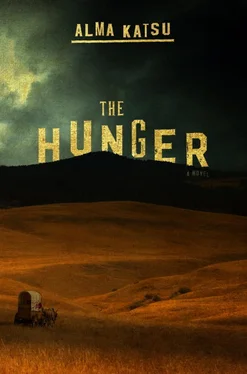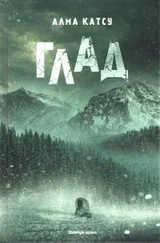Алма Катсу - The Hunger
Здесь есть возможность читать онлайн «Алма Катсу - The Hunger» весь текст электронной книги совершенно бесплатно (целиком полную версию без сокращений). В некоторых случаях можно слушать аудио, скачать через торрент в формате fb2 и присутствует краткое содержание. Город: New York, Год выпуска: 2018, ISBN: 2018, Издательство: G. P. Putnam's Sons, Жанр: Ужасы и Мистика, Историческая проза, на английском языке. Описание произведения, (предисловие) а так же отзывы посетителей доступны на портале библиотеки ЛибКат.
- Название:The Hunger
- Автор:
- Издательство:G. P. Putnam's Sons
- Жанр:
- Год:2018
- Город:New York
- ISBN:978-0-735-21251-0
- Рейтинг книги:4 / 5. Голосов: 1
-
Избранное:Добавить в избранное
- Отзывы:
-
Ваша оценка:
- 80
- 1
- 2
- 3
- 4
- 5
The Hunger: краткое содержание, описание и аннотация
Предлагаем к чтению аннотацию, описание, краткое содержание или предисловие (зависит от того, что написал сам автор книги «The Hunger»). Если вы не нашли необходимую информацию о книге — напишите в комментариях, мы постараемся отыскать её.
The Hunger — читать онлайн бесплатно полную книгу (весь текст) целиком
Ниже представлен текст книги, разбитый по страницам. Система сохранения места последней прочитанной страницы, позволяет с удобством читать онлайн бесплатно книгу «The Hunger», без необходимости каждый раз заново искать на чём Вы остановились. Поставьте закладку, и сможете в любой момент перейти на страницу, на которой закончили чтение.
Интервал:
Закладка:
But so far she was just stuck on an endless journey surrounded only by the people she cared for least. Her husband’s family.
“Good morning, Betsy,” she said as her sister-in-law approached, forcing a smile. Women were always forced to smile. Tamsen had mastered it so well it sometimes frightened her.
“Good morning, Tamsen.” Betsy was a square woman, broad in the shoulders and hips with a doughy middle that a corset couldn’t control. “Did you hear the news? A boy farther up the line went missing.”
Tamsen was not surprised. The wagon train had already suffered misfortune after misfortune: signs, all of them, if you knew how to interpret them. Just last week, she opened a barrel of flour to find it infested with weevils. It had to be thrown out, of course, an expensive loss. The following night, a woman—Philippine Keseberg, young wife to one of the less savory men on the wagon train—had delivered stillborn. Tamsen grimaced, remembering how the darkness of the prairie seemed to enfold the woman’s wailing, trapping it in the air around them.
Then there were the wolves following them; one family lost its entire supply of dried meat to them, and the wolves had even carried off a squealing newborn calf.
And now, a boy was missing.
“The wolves,” Tamsen said. She hadn’t meant to connect the two incidents, but she couldn’t help it.
Betsy’s hand went to her mouth, one of her many affected habits. “But there were other children asleep in the tent,” she said. “Wouldn’t they have woken up…?”
“Who knows?”
Betsy shook her head. “It might have been Indians, of course. I’ve heard stories of Indians taking white children after they’ve attacked settlements…”
“Goodness, Betsy, have you even seen an Indian these last twenty miles?”
“Then what happened to that boy?”
Tamsen just shook her head. Terrible things happened to children—and women—all the time, in their own homes, by people you knew, people you thought you could trust. If that wasn’t bad enough, here they were living in close quarters with hundreds of strangers. Odds were that at least one of them was guilty of terrible sin.
But she herself would not fall victim to tragedy, not if she could help it. She had means, limited though they were: charms, talismans, ways to persuade evil to pass by your door.
Unfortunately, however, these were not capable of easing the evil within .
Nearby, a man Tamsen recognized as Charles Stanton was herding cattle with a switch. Younger than George, Stanton had the look of a man who spent his days working hard in the field, not in a shop somewhere. He glanced up and caught Tamsen staring. She looked quickly away.
“The truth is apt to be far worse than we could imagine,” Tamsen said, somewhat enjoying the way Betsy looked at her in shock.
“Where are your girls this morning? I only see three,” Betsy said. Her voice was filled with sudden agitation.
Usually Tamsen had her daughters walk the first half of the day, hoping it would keep them fit and slender. Beauty could be a problem for a girl, but it was one of the few weapons a grown woman had, and she wanted them to preserve theirs if they could. The older girls, Elitha and Leanne, George’s daughters by his second wife, would watch after the younger ones: Frances, Georgia, and Eliza. Today, however, only the teenagers walked ahead, with Frances weaving around them like a frisky calf, full of energy and happy to have both girls’ attention to herself. Betsy’s seven boys and girls were a distance in front of them, heads down, trudging together as mindlessly as oxen.
“There’s nothing to worry about. Georgia and Eliza are in the wagon,” Tamsen said. “They woke with fevers this morning and were fussy. I thought it best to let them rest.”
“Just so, yes. Little ones tire out so easily.”
Sometimes Tamsen was amazed to think that she was a mother. It didn’t feel possible that she and George had been married long enough to produce three children together. Their babies were lovely, the spitting image of herself as a child, thank heavens. Elitha and Leanne, on the other hand, took after their father: big-boned and a little horse-faced.
But she didn’t regret motherhood. Maybe it was one of the only things she didn’t regret. She was proud of her girls, in fact: had placed honey on their tongues when they were babies, as the Indian servant in Tamsen’s childhood home had taught her, so they would grow up sweet; had braided ropes of balsam fir and tucked it in their blankets so they would grow up strong.
They would always have options; they’d never be yoked into marriage, as she had been not once, but twice.
But Tamsen had her way of getting even, as some might call it.
Stanton met Tamsen’s eyes again. Betsy had gone ahead to catch up with her children, and so this time Tamsen didn’t look away, not until he did.
She reached out and let her fingertips dance over the wildflower blossoms. For a moment, she thought of the yellow coneflowers that dotted her brother Jory’s vast wheat fields, untamable and abundant. She knew home was ahead of her and not behind, that she should banish memories of Jory’s farm—and all thoughts of her life before—from her mind, but she couldn’t just now.
The blossoms bent and swayed at her touch, so delicate they almost tickled.
CHAPTER THREE

Mary Graves knelt in the grass and set down her metal tub beside the river. It was a peaceable stretch of the North Platte, slow and gentle, but maybe that was because summer had taken a bite out of it already. The land had all the earmarks of a coming drought.
Doing the washing for the large Graves family was one of Mary’s many responsibilities. Twelve people—her mother and father, five sisters and three brothers, not to mention her older sister Sarah’s husband—meant a lot of dirty clothes and linens, and Mary preferred to do a little every night rather than let it pile up. It was one of the few times she could be by herself. Her entire day, it seemed, was spent in the company of her family: minding her younger siblings, preparing meals alongside her mother, sitting with her sister by the fire in the evenings to mend clothes. From the minute she rose in the morning until she took to her bedroll, she was surrounded by a clutter of other people, assailed by voices and needs, stories and complaints. Sometimes it made her feel as if she were constantly standing in the middle of a hard wind, blown in every direction. Even from this distance the sound of raucous laughter and shouting carried to her from the encampment.
Normally she escaped just for the sheer pleasure of standing in silence, listening to nothing but the soft rustling of tall weeds in the breeze. Tonight, however, the reminder of the wagon line nearby didn’t bother her so much. The missing boy had left everyone spooked, even her. Poor Willem Nystrom. His family was part of the original wagon party and because there was little mixing with the newcomers, Mary had only ever seen him from a distance. But he seemed like a sweet boy, always playing and laughing, six years old and hair so blond it was almost white. Her brothers Jonathan and Franklin Junior were right around that age, and her heart jumped up in her throat at the thought of one of them simply vanishing from the middle of the camp. It was like one of those old fairy tales, of children suddenly whisked away into a netherworld, taken by angry spirits.
She took comfort in the campfires visible in the distance. The men were driving the cattle out to the taller grass to graze for the evening, hobbling horses so they wouldn’t wander off. They inspected axles and wheels for signs of wear and checked over the harnesses so all would be ready for the next day’s march. Children were returning to camp with armloads of firewood and kindling. She’d left her little brothers drawing the figure of a wheel in the dirt for a game of Fox and Geese. As much as possible, everyone was keeping to routine.
Читать дальшеИнтервал:
Закладка:
Похожие книги на «The Hunger»
Представляем Вашему вниманию похожие книги на «The Hunger» списком для выбора. Мы отобрали схожую по названию и смыслу литературу в надежде предоставить читателям больше вариантов отыскать новые, интересные, ещё непрочитанные произведения.
Обсуждение, отзывы о книге «The Hunger» и просто собственные мнения читателей. Оставьте ваши комментарии, напишите, что Вы думаете о произведении, его смысле или главных героях. Укажите что конкретно понравилось, а что нет, и почему Вы так считаете.







![Алма Катсу - Голод [litres]](/books/432580/alma-katsu-golod-litres-thumb.webp)




